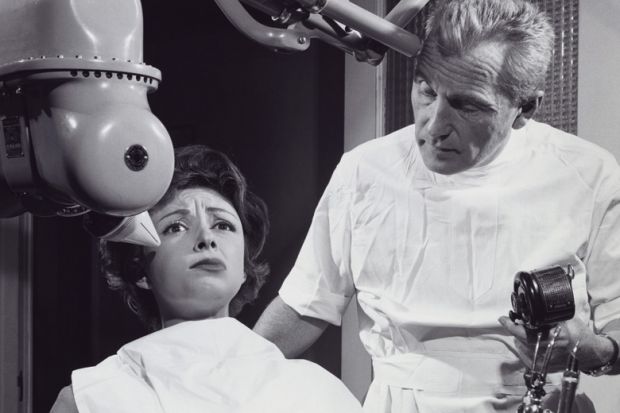Hundreds of students at one of the UK’s top dental schools have been given incorrect marks thanks to errors in recording their grades, Times Higher Education has learned.
Dozens of students at University College London’s Eastman Dental Institute were wrongly told they had gained a distinction in dentistry modules, while some who gained top marks were told they had merely passed thanks to administrative mix-ups, according to an internal report passed to THE.
In one case, a student was told they had failed their course when actually they had passed, documents show.
A UCL spokesman said an audit is currently under way to identify any students on the MSc in restorative dental practice course whose final degree award was affected by the mistakes.
Only two students on the four-year postgraduate course, whose annual fees can be up to £23,440, are thought to have been given the wrong overall degree classification pending further investigations, he added.
However, an unnamed UCL employee has accused authorities of “dragging their feet” in examining the problems, which were raised as far back as the summer of 2011.
Further scrutiny is needed to ensure that similar problems did not exist in other courses across dentistry and UCL more widely, with the “true extent of the problem not yet known”, the whistleblower told THE.
According to a copy of an academic committee review panel held in December 2013, the “scale of the problems became apparent” to school officials in June 2013 after the matter was investigated.
A report, initiated by the Eastman’s registry staff, found that there were 220 cases in which an incorrect module result was recorded and 83 cases in which an incorrect module outcome (ie, fail, pass, distinction) was recorded.
Of these, two pass outcomes were registered as a fail, 68 passes were entered as a distinction and 13 distinctions marked as a pass between 2005 and 2013, the report says.
With affected students still unaware of their inaccurate marks, it may mean that some practising dentists have been unfairly advantaged or disadvantaged in their careers, the whistleblower told THE.
“A patient may also wrongly think they are accessing someone with a distinction in a speciality area whereas in fact that accolade belonged to another student,” they explained.
“I’m not sure this constitutes a risk to patients, but they could be making healthcare decisions on the basis of inaccurate information,” they added.
According to the 2013 UCL report, “human errors led to the corruption of the assessment data, specifically through transcription errors in moving data from one Excel spreadsheet to another...[into the] wrong location”.
However, the “complex and inconsistent processes used” had “created a greater risk for error”, with the “transfer of data [occurring] several times across mark sheets”.
“High workloads”, the “challenging nature of the flexible modular programme and its students”, poor checking procedures and a “failure to draw known errors to the [Eastman’s] registry’s attention” are also mentioned in the report.
A UCL spokesman said the Eastman had “properly reported the matter to the registrar” once concerns were raised and a review had “recommended that the marks related to this programme be reviewed in more detail and that the administration procedures within the institute be restructured”.
A more detailed audit is under way to confirm whether the two students identified so far, and any others, had been given the wrong degree, he added.
“If any students are found to have received an incorrect final degree award, they will be duly notified,” the spokesman said.




